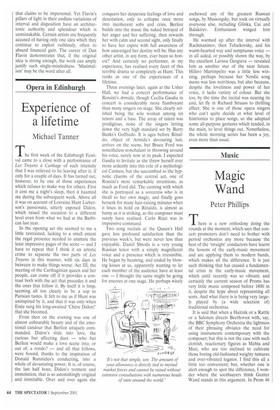Experience of a lifetime
Michael Tanner
The first week of the Edinburgh Festival came to a close with a performance of Les Troyens a Carthage of such intensity that I was relieved to be leaving after it, if only for a couple of days. It has turned out, however, to be one of those experiences which refuses to make way for others. First it cost me a night's sleep, then it haunted me during the subsequent week. Above all it was on account of Lorraine Hunt Lieberson's passionate, utterly exposed Didon, which raised the occasion to a different level even from what we had at the Barbican last year.
In the opening act she seemed to me a little restrained, lacking to a small extent the regal presence needed to animate the least impressive pages of the score — and I have to repeat that I think it an artistic crime to separate the two parts of Les Troyens in this manner, with six days in between to make things worse. Act III, the meeting of the Carthaginian queen and her people, can come off if it provides a contrast both with the act that precedes it and the ones that follow it. By itself it is limp, seeming all too clearly to be a sop to Parisian tastes. It felt to me as if Hunt was uninspired by it, and that it was only when Ende sung his long-awaited `Chere Didon!' that she bloomed.
From then on the evening was one of almost unbearable beauty and of the emotional candour that Berlioz uniquely commanded. Didon's slide into love, the curious but affecting duet — who but Berlioz would make a love scene into, or out of, a rondo? — and all that follows, were bound, thanks to the inspiration of Donald Runnicles's conducting, into a whole of devastating power. It is, of course, the last half hour, Didon's torment and immolation, that is so astonishingly original and inimitable. Over and over again she
conquers her desperate feelings of love and detestation, only to collapse once more into incoherent sobs and cries. Berlioz builds into the music the naked betrayal of her anger and her suffering, then rewards her with calm and second sight, only finally to have her expire with full awareness of how unavenged her destiny will be. Has any other artist, in any form, ever been so honest? And certainly no performer, in my experience, has realised every facet of this terrible drama so completely as Hunt. This ranks as one of the experiences of a lifetime.
Three evenings later, again at the Usher Hall, we had a concert performance of Rossini's Annida, though Cecilia Gasdia in concert is considerably more flamboyant than many singers on stage. She clearly relished being the sole woman among six tenors and a bass. The array of talent was prodigious, none of the singers letting down the very high standard set by Barry Banks's Goffredo. It is ages before Rinaldo, object of Armida's devouring lust, arrives on the scene, but Bruce Ford was nonetheless nonchalant in throwing around his voice, surely now at its peak. I expected Gasdia to levitate as she threw herself ever more ardently into this role of a mythological Carmen, but she succumbed to the hypnotic charms of the central act, one of Rossini's most remarkable inventions, as much as Ford did. The cunning with which she is portrayed as a sorceress who is in thrall to her own magic, and finally goes berserk for many hair-raising minutes when it loses its hold on Rinaldo, is almost as funny as it is striking, as the composer must surely have realised. Carlo Rizzi was in impressive command.
Two song recitals at the Queen's Hall gave less profound satisfaction than the previous week's, but were never less than enjoyable. Daniil Shtoda is a very young Russian tenor with a simply magnificent voice and a presence which is irresistible. He began by beaming, and ended by blowing kisses at us, apparently wanting to let each member of the audience have at least one — I thought the same might be going for encores at one stage. He perhaps wisely eschewed any of the greatest Russian songs, by Mussorgsky, but took on virtually everyone else, including Glinka, Cui and Balakirev. Enthusiasm winged him through.
He warmed up after the interval with Rachmaninov, then Tchaikovsky, and his warm-hearted way and sumptuous voice — in all aided, or possibly shown the way, by the excellent Larissa Gergieva — revealed him as another star of the near future. Hillevi Martinpelto was a little less winning, perhaps because her Nordic song menu was less nutritious, but also because, despite the loveliness and power of her voice, it lacks variety of colour. But she too, by the time the recital was nearing its end, let fly in Richard Strauss to thrilling effect. She is one of those opera singers who can't quite decide at what level of histrionics to place songs, so she adopted some all-purpose gestures which tended, in the main, to level things out. Nonetheless, the whole morning series has been a joy, even more than usual.


























































 Previous page
Previous page